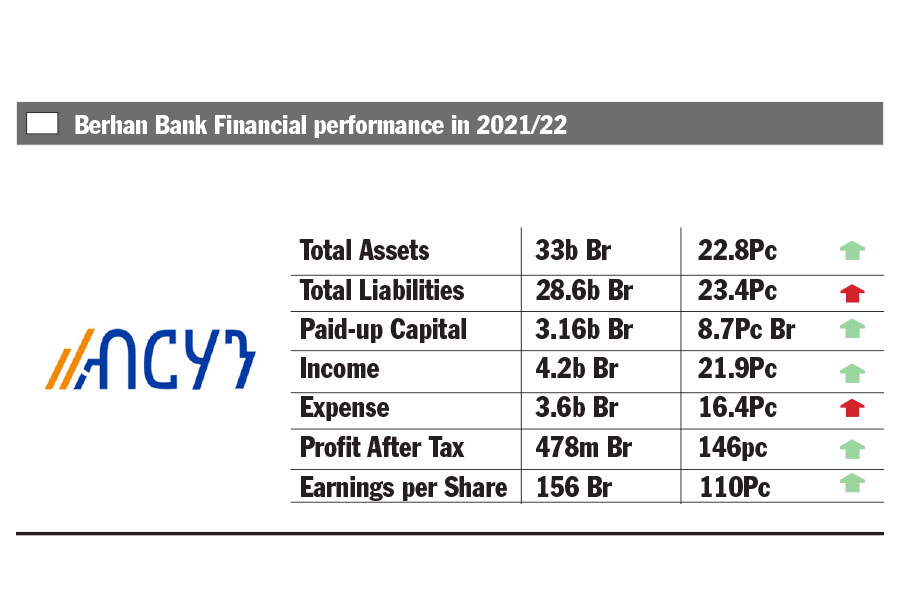
Radar | Apr 30,2022
May 15 , 2021
By Asseged G. Medhin
The opportunities for expansion provided by the e-payment service for the financial industry are quite enormous but perhaps only for those that understand its dynamics and traverse the unique challenges presented, writes Asseged Gebremedhin, deputy CEO of Global Insurance.
One of the most important changes to the financial sector over the past two decades is the introduction of digital services to streamline financial inclusion and smoothen the flow of money. This is a development that continues to open up with the introduction of mobile payment services into the fintech sector, including Ethio telecom's Telebirr.
This makes sense. Not only in Ethiopia but even in the most developed countries in the world, there are mobile phone users that live within informal or cash economies without access to financial services - no credit or savings or means of insuring their property and ventures. The technology that allows phones and the internet to work has a far larger reach than brick-and-mortar financial outlets. By integrating the two a valuable but highly fragmented market could be brought in from the cold.
The number of mobile users is significantly higher in Ethiopia. Ethio telecom, currently the only telecoms company in the country, has over 40 million users across the country. Growing by hundreds of thousands every year, the telecoms company also has about 20 million users online. At the same time, the banked population is below a third of adults.
This will also have many potentials for the insurance sector, especially in the micro-insurance categories, by bringing down costs. In the agricultural sector, crop, livestock and horticulture insurance could be better manageable and easy to make transactions on through mobile payments. The dominant areas of the country, which are heretofore closed to the financial sector, can now be opened for investment.
Any settlement of financial transactions and settlements of obligations are highly costly through any form of manual processing and analogue documentation. E-payment service alternatives reduce transaction costs and add value through flexibility, convenience and dynamism.
But laying the groundwork for fin-tech is not enough. It demands work to bring it to the ground and a financial industry determined to bring to bear their experience, skill and attitude beyond the negative force of traditionalists.
Change forces companies to be fast and flexible as they attempt to create value for customers. This requires leaders that are business literate and can build cultures of learning and innovation.
Our existing leadership, in its broader sense, should inject chaos navigators, business geographers, leadership liberators and economic integrators into the business. They should ride the opportunities offered by chaos and disruption and modernise the business yardstick for success.
The digital space is, in this case, the main disruptor. It has been a facilitator of affordable and accessible banking and insurance (micro-insurance) services in developing countries. It evidently requires awareness on how it would transform the agricultural sector in an integrated approach, both for the public and market players with their feet already in the evolving market.
The opportunities for expansion are quite enormous but perhaps only for those that understand the dynamics of mobile money systems and traverse the unique challenges that they present. Long-distance remittances become swifter, and micropayments are easier to make than ever. Common banking services such as statement requests, fund transfers, balance inquiries, payments to third parties and the ability to purchase prepaid airtime are easily effected. Customer experience is also significantly improved. There are no waits, or the old vocabularies of the traditional banking service such as "sorry can you come back later."
The government can nudge market players to move in the right direction through incentives such as tax cuts. This is of course with the view that the hand of the government is kept in check and that the movement of the market is towards more and more liberalisation. More critically, forces of traditionalism should give way to change agents and business leaders that can catapult their vision through organised effort and strategic direction.
PUBLISHED ON
May 15,2021 [ VOL
22 , NO
1098]


Radar | Oct 09,2021

Fortune News | Jan 28,2023

Fortune News | Feb 08,2020

Fortune News | Nov 12,2022

Radar | Aug 05,2023

My Opinion | 131499 Views | Aug 14,2021

My Opinion | 127855 Views | Aug 21,2021

My Opinion | 125833 Views | Sep 10,2021

My Opinion | 123463 Views | Aug 07,2021

Dec 22 , 2024 . By TIZITA SHEWAFERAW
Charged with transforming colossal state-owned enterprises into modern and competitiv...

Aug 18 , 2024 . By AKSAH ITALO
Although predictable Yonas Zerihun's job in the ride-hailing service is not immune to...

Jul 28 , 2024 . By TIZITA SHEWAFERAW
Unhabitual, perhaps too many, Samuel Gebreyohannes, 38, used to occasionally enjoy a couple of beers at breakfast. However, he recently swit...

Jul 13 , 2024 . By AKSAH ITALO
Investors who rely on tractors, trucks, and field vehicles for commuting, transporting commodities, and f...

Jun 28 , 2025
Meseret Damtie, the assertive auditor general, has never been shy about naming names...

Jun 21 , 2025
A well-worn adage says, “Budget is not destiny, but it is direction.” Examining t...

Jun 14 , 2025
Yet again, the Horn of Africa is bracing for trouble. A region already frayed by wars...

Jun 7 , 2025
Few promises shine brighter in Addis Abeba than the pledge of a roof for every family...

Jun 29 , 2025
Addis Abeba's first rains have coincided with a sweeping rise in private school tuition, prompting the city's education...

Jun 29 , 2025 . By BEZAWIT HULUAGER
Central Bank Governor Mamo Mihretu claimed a bold reconfiguration of monetary policy...

Jun 29 , 2025 . By BEZAWIT HULUAGER
The federal government is betting on a sweeping overhaul of the driver licensing regi...

Jun 29 , 2025 . By NAHOM AYELE
Gadaa Bank has listed 1.2 million shares on the Ethiopian Securities Exchange (ESX),...